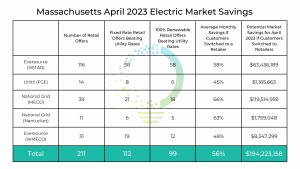BOSTON, MA (May 2, 2023) – Instead of encouraging electric utility ratepayers to save money by taking advantage of offers from retail energy suppliers that are below the utility’s rate in every territory across the state, today the Attorney General’s Office of Massachusetts recommended that the legislature eliminate the electric supply market for residential consumers.
An analysis using only the offers available on the state-managed website, EnergySwitchMA.gov, shows that if all Massachusetts customers had enrolled with the lowest available fixed-rate offer from a retail provider, Massachusetts customers could have saved $194,223,158 in April 2023.
The Attorney General’s recommendation was accompanied by a consultant’s analysis of the residential electric supply market in Massachusetts. Advertised as a 2023 update, the report does not include data past September 2021 and focuses on a limited period when utility rates were in decline.
The report also fails to consider the value-added aspects and varying terms of service of many of the retail products in which customers are enrolled, including 100% renewable energy, unlimited usage, flat-rate bill, and free products with enrollment such as electric vehicle chargers, smart home thermostats and more.
In a competitive energy market, customers have the option and right to decide if they wish to pay a sometimes-higher premium for the additional derived value. Further, with the current level of market volatility, price stability achieved by longer term, fixed price contracts provide significant value to many Massachusetts electricity consumers. Unfortunately, in this report, the variety of plans customers enrolled in with retailers were compared against basic six-month utility service, providing a flawed comparison and skewed reporting to favor the utility.
“I opt to pay a little more to get 100% clean energy from my current provider. There’s a benefit to having suppliers to choose from in electricity particularly when prices are posted online and it’s so easy to make comparisons. There may be some confusion on the part of legislators on how things are working or they may be focusing exclusively on price and not any other considerations,” Larry C., South Weymouth, MA.
This comes on the heels of unprecedented utility rate shock during a time when retail energy suppliers are delivering significant relief to Bay Staters, providing stable alternatives to utility rates that have nearly doubled in the past year.
2022-2023 Winter & Spring Rates for Massachusetts Residential Customers:
| Utility Supplier | Rate Term | Supply Rate | Rate Term | Supply Rate |
| NStar-Eversource | 7/1/22 – 12/31/22 | 17.9 ¢/kWh | 1/1/23 – 6/30/23 | 25.6 ¢/kWh |
| WMECo-Eversource | 7/1/22 – 12/31/22 | 15.4 ¢/kWh | 1/1/23 – 6/30/23 | 21.9 ¢/kWh |
| National Grid | 5/1/22 – 10/31/22 | 11.5 ¢/kWh | 11/1/22 – 4/30/23 | 33.9 ¢/kWh |
| Unitil | 6/1/22 – 11/30/22 | 13.4 ¢/kWh | 12/1/22 – 8/31/23 | 22.2 ¢/kWh |
A six-month review of winter and spring rates shows that savings could have topped $1.1 billion. The average Eversource – NSTAR customer could see savings of over 50% on their energy bill by enrolling with the lowest available fixed rate offer.

“I recently chose a set rate on a monthly basis because I knew I was going to have some fairly significant increase in my electricity use and I was able to lock in a price that works very well for me. After seeing the prices for Eversource in January went up to over 25 cents, that’s substantially higher than what I’m paying right now and to only be tied into one choice makes no sense to me. They need to talk to some of their constituents who use that and they need to understand it’s a really valuable tool that can save money in an environment where everybody is going through this inflationary period.” — Mike K., East Sandwich, MA
Fixed rates, long-term contracts, and unlimited usage plans help customers avoid rate shock and provide customers with options and a wide range of value-added products and services not included in default service. Currently over half of the offers available on EnergySwitchMA.gov are fixed-rate plans with prices beating standard utility service, and many are 100% renewable plans.
“It’s shocking that the Office of Attorney General would recommend closure of a market so many Massachusetts residents have chosen to participate in and are benefiting from. We are supportive of market reforms to better protect consumers. As we have told them, we stand ready to work with the AG’s office, DPU, and the legislature on such market reforms that will prevent bad actors from freely engaging customers and enable suppliers who are following the rules to continue to serve the customers that chose to enroll with them,” said Chris Ercoli, President and CEO of REAL.
Last summer, more than 1,200 customers signed a petition telling their legislators to oppose any legislation that would close competition and remove their ability to access the variety of products available from retail energy suppliers. Many expressed concern that they would no longer be able to sign up for clean energy plans or would lose their ability to shop for the best electricity rates and fixed-rate contracts not currently offered by their utility. Others objected that ending competition would remove the utilities’ incentive to compete through lower prices and better service.
“I think you should listen to the people who have benefited from the competitive market and respect their wishes that there should be competitive options available.” —Young K., Brookline, MA
In January, Massachusetts lawmakers sent a letter to the Department of Public Utilities asking the agency to address rising utility rates. In the absence of proactive education to ratepayers about their options to shop, the Retail Energy Advancement League developed a shopping guide to help customers navigate the EnergySwitchMA website with explanations of contract terms and helpful shopping tips.
“The lack of customer education on their ability to shop is an issue. Price isn’t the only reason customers shop, but in the face of such significant rate increases and with the lack of resources and proactive customer education from the Consumer Advocate and state, we developed resources to help inform customers as they review offers and contract terms,” said Chris Ercoli, President and CEO of REAL.


